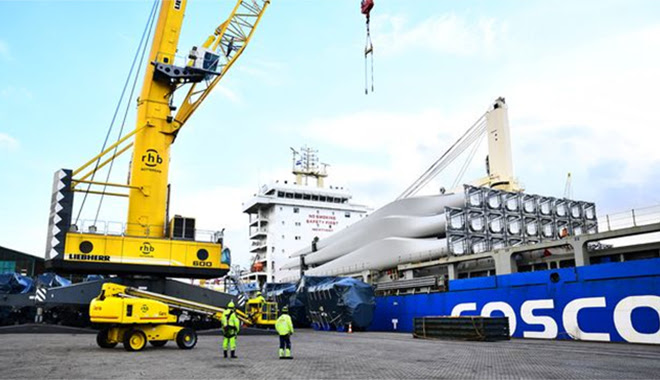
-
Port of Rotterdam Q1 volumes weighed down by Ukraine conflict
-
First-quarter freight volumes slid 1.5% year-on-year at Rotterdam Port as the port operator admits the Ukraine war led to serious uncertainty in world trade and changes in logistical parameters
-
Mineral oil products and iron ore throughput fell while LNG and other liquid cargo as well as dry bulk increased
-
Container cargo volume eased from a year ago
-
Rotterdam port managers expect the gateway’s operations to feel until the yearend further impact of Western economic sanctions against Russia, which accounted for 13% of cargo volumes last year
Freight volumes at the Port of Rotterdam, Europe’s biggest port, shrank 1.5% to 113.6 million tons in the first quarter this year from 115.2 million tons a year ago, as Russia’s invasion of Ukraine caused “serious uncertainty in world trade and changes in logistical parameters,” the port authority says.
Mineral oil products and iron ore led the decline while throughput of LNG and other liquids increased, along with dry bulk, particularly raw materials. Container volume fell slightly below the 2021 level, the Port of Rotterdam Authority said in a press release on April 25.
With Russia accounting for 13% of annual throughput last year, the port managers admit business won’t be the same again the rest of 2022 as the effects of Western economic sanctions against that country weighing in.
“Although we started the year exceptionally well, the world was hit by the war in Ukraine in late February. Besides the fact that this conflict is a terrible humanitarian disaster, it led to serious uncertainty in world trade and changes in logistical parameters,” said Allard Castelein, chief executive of the Port of Rotterdam Authority.
“Although no one can predict how this will unfold, we expect that the developments in Ukraine and the seriously deteriorated relationship between Russia and many other countries will impact throughput volumes for the rest of the year as well.”
The port’s quarterly report said last year, 62 million tons or 13% of Rotterdam’s almost 470 million tons of throughput was Russia-oriented. Many energy carriers from Russia were imported via the Port of Rotterdam. In 2021, roughly 30% of crude oil, 25% of LNGs and 20% of oil products and coal came from Russia.
Russia exports steel, copper, aluminum and nickel through Rotterdam. Last year, 8% of the container handling was Russia-oriented, the port reported.
“As the war in Ukraine only began in late February, the impact on throughput volumes in the first quarter was still limited. Meanwhile, the impact of the sanctions and of the decisions of individual companies not to do any business with Russia any longer, has become noticeable in almost all sectors,” the report said.
In total, liquid bulk throughput eased 1.0% to 51.5 million tons. The volume of crude oil remained virtually unchanged (-0.2% to 25.5 million tons). Mineral oil products, especially fuel oil, dropped 20.5% to 13.5 million tons, mainly due to lower production in Russia, which led to less fuel oil entered Rotterdam from Russia.
In the first quarter, LNG throughput surged 77.7% to 2.7 million tons.
In the dry bulk segment, iron ore and scrap fell 19.5% to 5.6 million tons. High energy costs and diminishing demand for steel caused German steel production to slump. Reduced demand was especially due to disruptions in logistics chains, causing production levels of steel processing companies to drop.
Coal throughput slightly rose 3.5% to 3.9 million tons, as demand for energy coal for power plants increased more sharply than demand for cokes for blast furnaces. Other dry bulk increased 33.5% to 3.9 million tons.
The report said primarily the falling transhipment volumes led to a 5.4% decline in container throughput to 35.6 million tons. In terms of TEU, (20-foot equivalent units), the throughput dropped less dramatically by 1.4% to 3.6 million TEU), since the average container weight was lower and more empty containers were transported.
In March, the impact of the war in Ukraine was reflected in falling volumes to Russia. Most shipping companies have halted bookings for Russian container cargo, and most deep-sea terminals do not accept any export cargo from Russia any longer. This will hit transhipment volumes to Russia even further, the report said.




